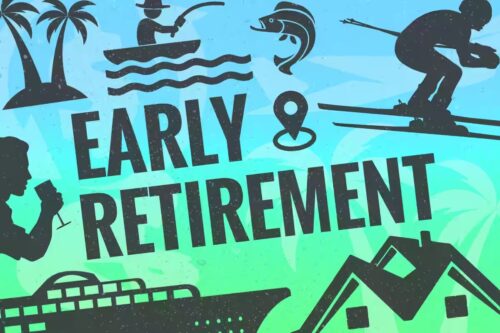“All men think all men mortal, but themselves.”
– Edward Young

A recent study of a cohort of Austrian retirees came to the conclusion that retiring early was likely to decrease your life expectancy, particularly if you are a male. The title of the study even could lead one to believe that the best way to live forever is to work forever. The title is “Fatal Attraction? Access to Early Retirement and Mortality.” It’s not one that inspires confidence, and it’s easy for writers to come to the conclusion that retiring is bad for your health without looking at the underlying causes which the authors of the study went to some lengths to tease out the underlying causes.
First off, it is important to understand that causation is not the same as correlation. There’s probably a high correlation between sunburns and the amount of sunshine in a day. That one is pretty easy to understand. Ultraviolet rays cause sunburn. However, there’s also a strong occurrence of the sun rising on days that end with Y. While the two are correlated (it happens every day), there is no causation. The day ending in Y does not cause the sun to rise. The sun rising does not cause the day to end in Y.
The same is true for this general conclusion about retirement and early mortality. While the two are correlated in the study – there was a link between retiring early and dying earlier – that is not to say that there is causation.
Chicken Little thinks early retirement causes death. – Click to Tweet
Deeper in the study, behind the headline number showing an increase in male mortality tied to early retirement, the authors pulled out two main drivers of the increased mortality.
- Health-related problems. There certainly is an argument to be made that some people choose early retirement because health prevents them from working to a normal retirement age. The authors of the study work to eliminate selection bias of unhealthy workers who choose to retire early because they’re unhealthy, but they cannot. They do, however, point out that there is a significant amount of death caused by preventable causes.
- Involuntary retirement. Again, while they don’t have definitive data about whether or not people retire after being laid off, they do a reasonable job of making inductive reasoning to determine whether the retirement was voluntary. Involuntary retirements seemed to have a negative effect on life expectancy.
How to retire early and avoid an early grave.

It’s never too early to start thinking about retirement, unless, of course, you never plan on retiring . Here are a couple of things to consider, particularly in light of the Austrian retirement study (which was conducted by a Swiss university, by the way):
- Establish and keep a healthy lifestyle. This includes getting adequate and sufficient exercise, eating well, and staying active. Your physical, mental, and spiritual health is important. Don’t smoke, and don’t drink in excess. It’s impossible to tell if it happened, but the authors of the study posit that it’s likely that retirees engaged in unhealthy behaviors. My personal theory is that they became inactive, and the inactivity led to increased health problems. Therefore, it’s important to retire TO something so that you have a reason to stay engaged.
- Find meaning in life outside of your work. Getting laid off stinks, no matter what age you are. One of the ways to build mental resiliency is to have areas of your life that invigorate you that are outside of your regular job.
- If you are laid off, find work as quickly as possible, even if it’s temporary or part-time. A corollary to finding meaning outside of your job is that if you can find another job, you fill that gap which is caused by the shock of losing your job. If getting laid off provided the happy “golden parachute” that allowed you to retire happily then this suggestion will not apply.
Don’t get caught up in the Chicken Little conclusions about early retirement causing death. There are other factors involved that you can prepare for long before you retire early that will give you a higher probability of a long and prosperous post-retirement life.
Author Profile
- John Davis is a nationally recognized expert on credit reporting, credit scoring, and identity theft. He has written four books about his expertise in the field and has been featured extensively in numerous media outlets such as The Wall Street Journal, The Washington Post, CNN, CBS News, CNBC, Fox Business, and many more. With over 20 years of experience helping consumers understand their credit and identity protection rights, John is passionate about empowering people to take control of their finances. He works with financial institutions to develop consumer-friendly policies that promote financial literacy and responsible borrowing habits.
Latest entries
 Low Income GrantsSeptember 25, 2023How to Get a Free Government Phone: A Step-by-Step Guide
Low Income GrantsSeptember 25, 2023How to Get a Free Government Phone: A Step-by-Step Guide Low Income GrantsSeptember 25, 2023Dental Charities That Help With Dental Costs
Low Income GrantsSeptember 25, 2023Dental Charities That Help With Dental Costs Low Income GrantsSeptember 25, 2023Low-Cost Hearing Aids for Seniors: A Comprehensive Guide
Low Income GrantsSeptember 25, 2023Low-Cost Hearing Aids for Seniors: A Comprehensive Guide Low Income GrantsSeptember 25, 2023Second Chance Apartments that Accept Evictions: A Comprehensive Guide
Low Income GrantsSeptember 25, 2023Second Chance Apartments that Accept Evictions: A Comprehensive Guide

